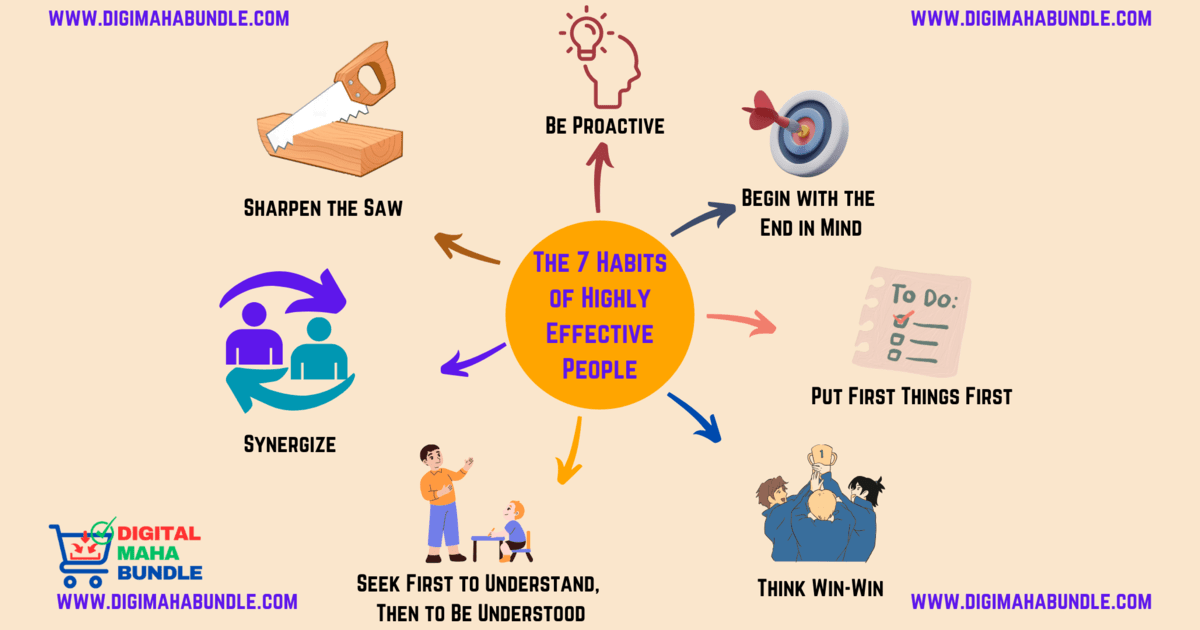Book by Stephen Covey
The 7 Habits of Highly Effective People
In a world full of self-help and personal development literature, Stephen Covey’s “The 7 Habits of Highly Effective People” is a timeless classic. Over the years, this 1989 book has changed a great deal of people’s lives as well as businesses and organisations. We will delve deeply into the wisdom found in this book and examine the seven habits that can lead to both professional and personal success in this in-depth book review.
The 7 Habits of Highly Effective People
- Habit 1: Be Proactive
- Habit 2: Begin With the End in Mind
- Habit 3: Put First Things First
- Habit 4: Think Win-Win
- Habit 5: Seek First to Understand, Then to Be Understood
- Habit 6: Synergize
- Habit 7: Sharpen the Saw

Chapter 1: Be Proactive
The first habit Covey explores in his seven is “Be Proactive.” This behaviour encourages people to take charge of their own lives and choices. Proactive people recognise that they are in control of how they react to outside events, as opposed to being victims of their circumstances. Covey highlights that our choices, not the circumstances, determine what we do. Readers can effectively overcome obstacles and shape their own destinies by embracing a proactive mindset.
Covey reminds us that being proactive means accepting responsibility for our actions rather than trying to ignore the situation as it is. This habit teaches us to be the masters of our own destiny and serves as the cornerstone for the other six.
Chapter 2: Begin with the End in Mind
“Begin with the End in Mind,” the second habit, challenges readers to clearly identify their values and purpose in life. Covey presents the idea of personal mission statements as a means of providing direction when making decisions. People can live more fulfilling lives by ensuring that their actions are consistent with their values by establishing long-term goals and understanding what really matters.
This practice leads to a more purpose-driven existence by keeping readers focused on what is truly important in a world full of distractions.
Chapter 3: Put First Things First
The third habit, “Put First Things First,” becomes applicable once your objectives are crystal clear. The core of this habit is efficient time management. Covey presents a potent idea known as the “Time Management Matrix,” which assigns tasks a priority and an urgency level. Focusing on significant but non-urgent tasks helps people be more productive and accomplish their objectives.
By prioritising tasks that are in line with their long-term goals, readers can break free from the cycle of reactive, crisis-driven work thanks to Covey’s time management principles. Developing this habit is crucial for anyone who wants to maximise their time and resources.
Chapter 4: Think Win-Win
In Covey’s framework, “Think Win-Win” is the fourth habit. This idea inspires people to develop an attitude of reciprocity in both their personal and professional interactions. According to Covey, if people approach situations with an abundance mentality, then both parties can come out ahead in any interaction.
Readers can develop collaboration and trust in both their personal and professional lives by concentrating on long-term relationships and looking for win-win solutions. Covey reminds us that there are other ways to succeed besides rivalry and a scarcity mentality, and that working towards a win-win solution can produce more enduring and satisfying outcomes.
Chapter 5: Seek First to Understand, Then to Be Understood
The foundation of the fifth habit is effective communication: “Seek First to Understand, Then to Be Understood.” Covey highlights the value of listening with feelings of compassion and having a sincere desire to understand other people’s perspectives before expressing our own.
Covey shows the “Emotional Bank Account” idea, highlighting the significance of using sympathetic communication to establish positive relationships and trust. This behaviour is essential for settling disagreements, improving connections both personally and professionally, and encouraging teamwork.
Chapter 6: Synergize
As the sixth habit, “synergy” refers to maximising a team’s or group’s combined strength. The idea that the whole is greater than the sum of its parts is what Stephen Covey refers to as synergy. Together, people with different viewpoints and strengths can achieve far more than they could separately.
In both personal and professional settings, Covey’s talk on the synergy of connections highlights the importance of collaboration, transparency, and balancing various points of view. People can reach new heights of productivity and creativity by adopting this behaviour.
Chapter 7: Sharpen the Saw
“Sharpen the Saw,” the last habit, highlights the importance of self-renewal. Covey compares it to a woodcutter who needs to stop occasionally to sharpen their saw in order to cut more effectively. People need self-care time in order to maintain and rejuvenate their physical, mental, emotional, and spiritual well-being.
Covey offers a comprehensive strategy for self-care, encouraging readers to make investments in their mental and spiritual development, physical health, and emotional well-being. People who maintain balanced, self-renewing lifestyles can continue to be productive for a longer period of time.
The fact that The 7 Habits of Highly Effective People are based on universal ideas is one of the factors contributing to its popularity. These are not unique practices for entrepreneurs or company executives. Anyone who wishes to lead a more successful and meaningful life should use them.
The following are a few of the book’s main lessons learned:
- By forming specific routines, we can take charge of our own future.
- Those that are effective concentrate on growing their sphere of influence.
- We need to act according to principles with a clear vision for the future.
- Our responsibilities and actions should be prioritised according to importance rather than rush.
- In every conversation, we need to look for solutions that will benefit both parties.
- Prior to sharing our own opinions, we need to listen to others in order to fully understand what they have to say.
- In order to achieve more than we could alone, we ought to work together with others.
- To be productive in everything else in our life, we must invest in ourselves.
Conclusion: The Impact of “The 7 Habits of Highly Effective People”
“The 7 Habits of Highly Effective People” is a guide for both professional and personal change, more than just a book. The timeless lessons shared by Stephen Covey have guided millions of people to better success and fulfilment. Whether your goal is to become a better leader, strengthen your connections with others, or just live a more purposeful life, this book offers invaluable perspectives and practical advice to help you get there.
Covey’s habits are a way of life and a change in mindset rather than fast treatments. They push readers to examine themselves deeply, reevaluate their priorities, and make thoughtful choices that are consistent with their values and long-term objectives. Even though the book was released more than thirty years ago, its ideas are still valuable today.
People can become proactive, goal-oriented, and effective in both their personal and professional life through implementing these seven habits into practice. They can develop closer bonds with others, improve as listeners, and work together more skillfully. They can also continue to improve their abilities and maintain their health.
More than merely a book, “The 7 Habits of Highly Effective People” serves as a manual for both career and personal development. This book is a must-read for everyone interested in personal growth, regardless of experience level with self-help literature. Its ageless wisdom will enable you to develop into a highly successful individual who can accomplish their objectives and enjoy a happy life.
“The 7 Habits of Highly Effective People”– Book Availability in English Language
“The seven Habbits of Highly Effective People” is available in a variety of formats, including paperback, hardcover, ebook, and audiobook. You can purchase it from below links as per your preferable choices.
Listen Summery of “The 7 Habits of Highly Effective People”
“The 7 Habits of Highly Effective People”– Book Available in other Regional Languages
Marathi
Best Self Help Books:
- The Power of Your Subconscious Mind by Josef Murphy
- Rich Dad Poor Dad by Robert Kiyosaki
- The 7 Habits of Highly Effective People
- The Psychology Of Money BY Morgan Housel
Read More Books Summaries Here
The Psychology Of Money BY Morgan Housel
The 7 Habits of Highly Effective People
Rich Dad Poor Dad by Robert Kiyosaki
Graham McNeill’s Fulgrim Book Summary: An Amazing Horus Heresy Series Masterpiece
Twisted Games book summary: A Deep Dive into Ana Huang’s Unravelling Emotions












2 thoughts on “The 7 Habits of Highly Effective People ”